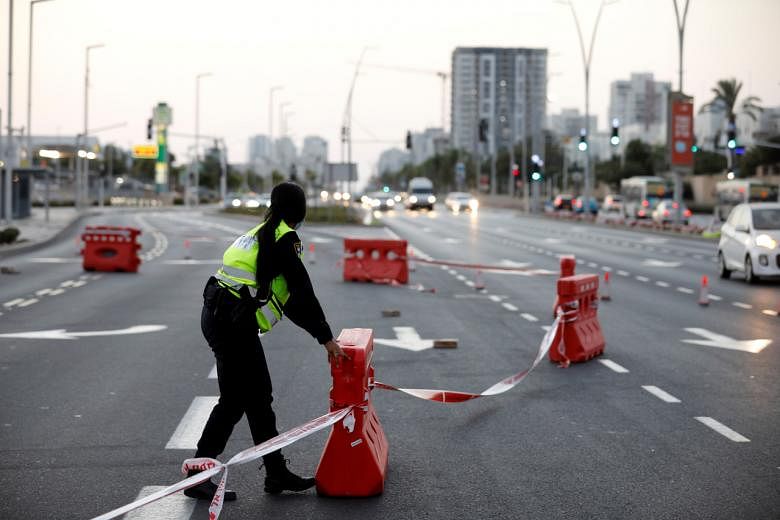TEL AVIV (BLOOMBERG) - The Israeli government sharply tightened lockdown restrictions for the next two weeks in an effort to rein in a coronavirus outbreak that's spun out of control.
Just last week, the government imposed its second lockdown since the pandemic began.
With daily new infections surging dramatically, the government voted early on Thursday (Sept 24) to clamp down further during a season of major Jewish holidays by almost totally idling the private sector, allowing only essential employees to work.
Gatherings for worship and mass protests against Prime Minister Benjamin Netanyahu will also be severely curtailed.
A decision is expected later in the day with regard to the possible curbing of operations at Ben-Gurion International Airport, the Ynet news website said.
The tightening, which goes into effect on Friday, was opposed by Finance Minister Israel Katz and the country's coronavirus czar, Dr Ronni Gamzu, who argued that it would cause unnecessary harm to an already battered economy.
"It was possible to advance steps to curtail the disease without dealing a mortal blow to factories and businesses in the private sector that don't receive the public and adhere strictly to Health Ministry regulations," Mr Katz said in a statement, adding his position was supported by Bank of Israel Governor Amir Yaron.
In a marathon debate of proposals overnight, Mr Netanyahu said the economy will be able to withstand the blow, Ynet reported.
A rushed reopening of schools, laxly enforced social distancing and mask wearing, and political infighting over how to address the disease's resurgence have converged in a health fiasco that threatens to overwhelm hospitals.
More than 200,000 people have been infected in the country of nine million and over 1,300 have died.
A record of nearly 7,000 new cases was reported on Tuesday.
The economy is also paying the price of policy blunders.
Unemployment remained stubbornly around 20 per cent, according to Israeli Employment Service data, even after the first lockdown was lifted in May.
Approximately 110,000 more people have joined the jobless rolls since the new lockdown went into effect on Friday, the Times of Israel reported.
The Bank of Israel has forecast a worst-case scenario of a 7 per cent economic contraction this year, and Mr Yaron again urged the government this week to finally pass a budget to help kickstart the economy after the crisis ends.
Ministers backed away from a politically fraught proposal to bar worshippers from synagogues on one of the most sacred days on the Jewish calendar, Yom Kippur, and debate was heated over whether to outright ban the protests, which have had been shielded from orders against mass gatherings, Channel 12 reported.
Mr Netanyahu has argued, without proof, that the protests have been a major vector of the virus spread.
During the debate of the proposals, ministers from a rival party accused him of trying to engineer a hermetic lockdown to shut the demonstrations down, Ynet reported.
While the protest movement has focused largely on Mr Netanyahu's fitness to serve while under indictment for corruption, it was grassroots despair over the economic situation that served as tinder.
Only 27 per cent of Israelis recently surveyed by the Israel Democracy Institute now trust the Prime Minister to lead the effort against Covid-19, down from a high of 57.5 per cent in early April, when Israel's assertive response to the early months of the outbreak was being lauded at home and abroad.











